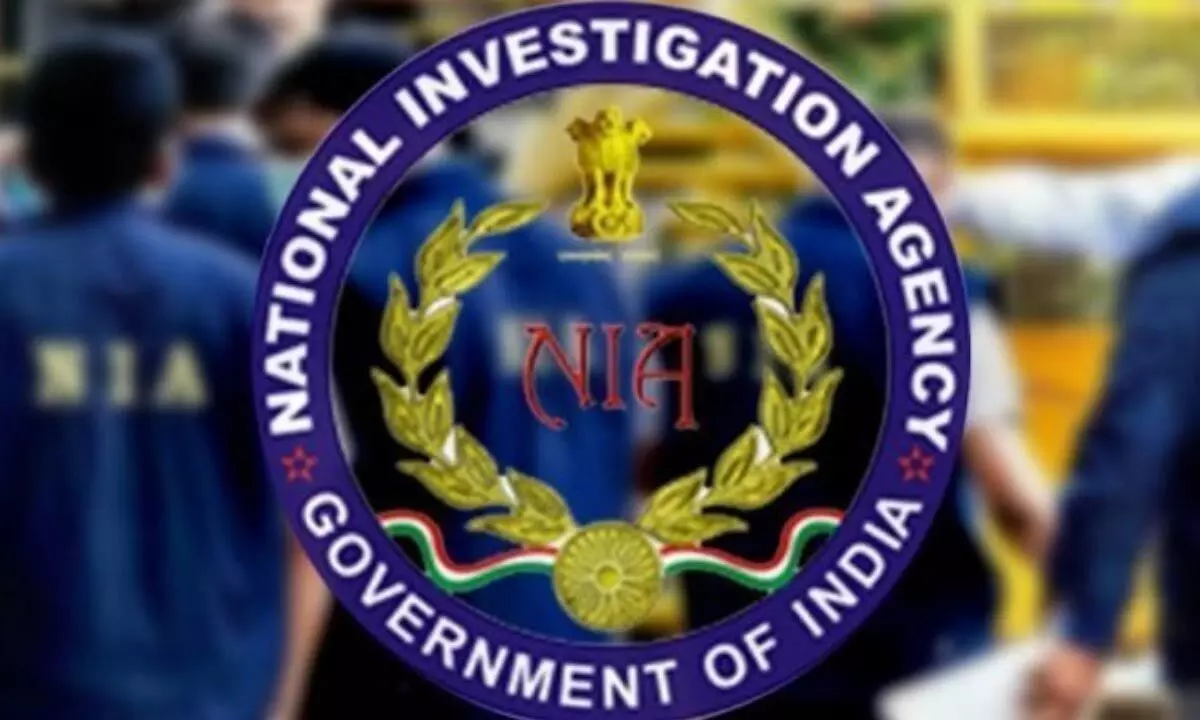Live
- PM Modi highlights govt's efforts to make Odisha prosperous and one of the fastest-growing states
- Hezbollah fires 200 rockets at northern, central Israel, injuring eight
- Allu Arjun's Family Appearance on Unstoppable with NBK Breaks Viewership Records
- Unity of hearts & minds essential for peace & progress, says J&K Lt Governor
- IPL 2025 Auction: I deserve Rs 18 cr price, says Chahal on being acquired by Punjab Kings
- EAM Jaishankar inaugurates new premises of Indian embassy in Rome
- Sailing vessel INSV Tarini embarks on second leg of expedition to New Zealand
- Over 15,000 people affected by rain-related disasters in Sri Lanka
- IPL 2025 Auction: RCB acquire Hazlewood for Rs 12.50 cr; Gujarat Titans bag Prasidh Krishna at Rs 9.5 crore
- Maharashtra result reflects the outcome of Congress' destructive politics: BJP's Shazia Ilmi
Just In
NIA Chargesheet Exposes International Syndicates In Assam


National Investigation Agency
- Explore how the National Investigation Agency (NIA) sheds light on the intricate operations of human trafficking networks, involving Bangladeshi and Rohingya victims, as it files a chargesheet against 24 individuals in Assam.
- Delve into the legal framework, investigative findings, and the plight of victims exploited by these syndicates.
The National Investigation Agency (NIA) has taken significant action against human trafficking networks operating in Assam, unveiling a complex web of international syndicates involved in the illicit trafficking of individuals from Bangladesh and Myanmar, particularly Rohingya refugees, into India. The recently filed chargesheet by the NIA names 24 individuals allegedly complicit in these activities, shedding light on the intricate mechanisms employed by these syndicates to facilitate illegal entry and settlement within India.
According to NIA officials, the accused individuals, including both Bangladeshi nationals and Rohingyas from Myanmar, were purportedly part of well-organized networks that specialize in human trafficking. These networks exploit vulnerable individuals seeking refuge or better economic prospects, luring them into India with promises of a brighter future. However, the reality for many of these victims is often one of exploitation and abuse.
The chargesheet, submitted before the NIA Special Court in Assam, outlines the legal framework under which the accused are being prosecuted. Various provisions of the Indian Penal Code, the Foreigners Act, and the Passport (Entry into India) Act, 1920, are invoked, underscoring the gravity of the offenses committed by the alleged traffickers.
Moreover, the investigation conducted by the NIA has revealed alarming details regarding the modus operandi of these syndicates. It is disclosed that the traffickers operate across multiple states, with a particularly active presence along the Indo-Bangladesh border in Tripura, Assam, and West Bengal. These regions serve as key transit points for trafficking activities, facilitating the movement of individuals across international borders with forged documents.
The arrests made by the NIA in collaboration with state police agencies highlight the extensive reach of these syndicates and the concerted effort required to dismantle their operations. Raids conducted across various locations resulted in the apprehension of multiple suspects and the seizure of incriminating evidence, including forged identity documents, bank records, and digital devices.
Furthermore, the investigation underscores the multifaceted nature of the trafficking phenomenon, revealing not only the economic exploitation of victims but also instances of forced marriage and other forms of abuse, particularly affecting women and girls. The plight of Rohingya women, reportedly being sold into marriage to older men, exemplifies the harrowing experiences faced by many individuals caught in the web of human trafficking.
Additionally, the involvement of local authorities in facilitating the procurement of forged Indian identity documents by Bangladeshi nationals raises concerns about the complicity of certain officials in perpetuating these crimes. The exploitation of bureaucratic loopholes and the complicit collaboration of individuals in positions of power further exacerbate the challenges faced in combatting human trafficking effectively.
Overall, the chargesheet filed by the NIA serves as a stark reminder of the pervasive nature of human trafficking and the urgent need for coordinated efforts at local, national, and international levels to combat this grave violation of human rights. By holding perpetrators accountable and advocating for the protection of victims, authorities aim to disrupt the operations of these syndicates and prevent further exploitation of vulnerable individuals.

© 2024 Hyderabad Media House Limited/The Hans India. All rights reserved. Powered by hocalwire.com






